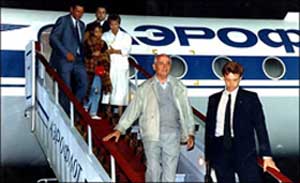Majority of Russians do not understand why USSR collapsed, poll says
Russia commemorates 14th anniversary of the August 1991 coup, which virtually changed the world

Russians still cannot understand why the USSR collapsed. Today is the 14th anniversary of the August 1991 coup in Russia – an attempt of high officials leaded by USSR Vice President Gennady Yanaev to overthrow President Mikhail Gorbachev, an attempt that led to the collapse of the Soviet Union. The All-Russian Public Opinion Research Centre(known for the Russian initials as VCIOM) reported about the attitudes of the Russians towards the event. It turned out that the number of people who approve of the actions of Boris Yeltsin, the leader of the struggle against the coup plotters, is slowly increasing. However, these are people who cannot remember their political views of 15 years from now. 
Fifteen percent of respondents say that in August 1991 their sympathy was with the State Committee for a State of Emergency (or GKChP), which was created by the plotters to preserve the union and oppose the democrats. The number of those who gave preferences to Boris Yeltsin and other opponents of GKChP increased from 21 to 27 percent in three years. Those who say that did not make up their minds at that time comprise 40 percent.
In 2001 there were 14 percent of GKChP supporters and 28 percent of its opponents. Those who could not make out the situation in 1991 were 31 percent. The attitudes have changed. Ten years after the coup 14 percent of Russians considered GKChP was right, 24 percent came over to Yeltsin's side and 44 percent still could not decide who was right in 1991.
Vladimir Petukhov, head of the Sociopolitical Processes Analysis Department thinks that in spite of the great number of hesitant people, there did care about the situation: “Today they say that although the majority of them did not participate in the events, they had clear opinion on what was happening in 1991. The figures prove that 30 percent supported the opponents of GKChP while only 13 percent were on the coup plotters' side. However, there is a great number of those who claimed they did not understand what was happening at that time and they cannot even remember their past opinion.”
Nowadays voters for United Russia Party and the Liberal Democratic Party of Russia say that in 1991 they preferred Yeltsin – 12 percent of them supported the State Committee, 29 percent were against it. The Communist Party supporters were more likely to choose GKChP 15 years ago (41 percent). The Russian Fatherland Party voters were split almost equally with a slight advantage of GKChP supporters (32 percent and 28 percent).
Sociologists asked Russians to imagine how they would act if they could get back to those August events now. It turned out that 18 percent would support the plotters and only 13 percent would go for Yeltsin. The Communist Party voters would mostly support GKChP: 47 percent would support it and only 15 percent would not. Fatherland Party voters would also go for GKChP (35 and 12 percent). The number of supporters and opponents of GKChP among United Russia voters would be equal (15 percent on both sides). Just a year ago there would have been more supporters of Yeltsin. When it comes to the Liberal Democratic Party voters, they presume that they would give their preference to GKChP, although last year the number of its supporters and opponents was almost equal.
There have been no dramatic changes in attitudes towards August 1991 coup in recent years. Almost half of the respondents (47 percent) consider the events just an episode of struggle for power between different groups of the country's authorities. This number is slightly changing: in 1994 it was 53 percent. At the same time the number of people who do not have clear opinion at the moment is growing. The number of those who consider the coup to be a tragedy with disastrous consequences still exceeds the number of people who consider the situation to be the victory of democracy that put the rule of the Communist Party to an end. The first ones account for 32 percent (against 27 percent in 1994). The number of the latter almost has not changed (7 percent in 1994 and 11 percent now).
On the 1991 file photo: Mikhail Gorbachev and his family return to Moscow from the Black Sea resort in August 1991 after the failure of the State Emergency Committee
Subscribe to Pravda.Ru Telegram channel, Facebook, RSS!


